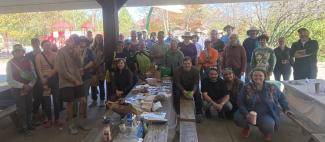By Crystal Zanders, Freelance Writer for More Life, Less Stuff campaign & Kim Sanchez, Ecology Center Communications Fellow
Despite the winter weather keeping us indoors, the sun is a shining reminder of the Spring to come. Distracting from the winter months, many of us begin to dream of sprouting greenery, rain showers, more daylight, and kinder temperatures. The More Life, Less Stuff campaign reminds you that Spring is inevitably around the corner and hopes to inspire you to cultivate community through gardening, growing, and seed sharing amongst your neighbors.
When I was a child in Tennessee, there was Japanese honeysuckle growing on the fence in the backyard. I looked forward to it blooming every summer because you could taste it in the air. So, when I saw some honeysuckle growing along the bank of Ford Lake in Ypsilanti one bright summer morning, for a moment, I was reminded of home. I had assumed that this honeysuckle was native to Tennessee, and I wondered how it got this far north — until I researched for this article. It turns out it shouldn’t have been at either location.
Japanese honeysuckle is considered an invasive species* in both Michigan and Tennessee. Invasive plant species are plants that are not native to the area where they are growing and cause ecological problems as they spread. Japanese honeysuckle is beautiful, but when it arrives in an area, it quickly takes over, crowding out other plants and hogging all of the sunshine. Japanese honeysuckle smells amazing, but it doesn’t belong here.
The good news is that there are community organizations committed to sharing seeds and protecting our natural lands. They do this by educating the community and hosting native plant seed swaps and other events. At a seed swap, community members share some of their extra seeds with their neighbors, encouraging folks to plant native species in their gardens.
Last October, organizers for the More Life, Less Stuff campaign attended the 8th Annual Seed Sharing Event that took place at Washtenaw County Farm Park — part of the Seeds to Community program. The event was free and open to the public. Through the guidance of a county naturalist, we learned how to spot and harvest native seeds to help protect our biodiversity and connect with our community while doing so.
Host Shawn Severance, a Washtenaw County park naturalist, reminded us that what we were there to do matters, saying, “It is significant to step in and support life. That’s what we’re doing here, together.”

Native Seeds Are Important
An initiative of Washtenaw County, Seeds to Community is a program working to restore native wildlife populations while strengthening human communities. Seed saving is important to restoration efforts since native plants are hard to come across in most commercial garden stores. Native plants are important to preserving the delicate balance of the ecosystem. Local bugs don’t always eat plants from other places. Without the bugs, we don’t have birds, and worse yet, a world without bugs is a world with a lot less food for everyone, birds and humans alike.
Principles of Seed Collecting
At the 8th Annual Seed Sharing Event, we learned that it’s important to use restraint when seed collecting, especially on public lands, and to be careful not to take too much. We followed several ethical and honorable harvesting principles to ensure that we wouldn’t over harvest seeds during our collection.
- Never take more than a third of any one resource in a given area.
- Take only what you need.
- Use what you take and do not let anything go to waste.
- Be grateful for what nature has provided.
- Reciprocate as much as you can.
More life should be right around us - Jonathan Parker
Seeds contain the potential for life. They connect us to nature, to our land and homes and histories, and to each other. I see native seeds as a physical manifestation of hope, healing people and the planet. By sharing seeds with one another, we celebrate life and share hope and healing.
* Not all honeysuckle. Some honeysuckle species are native to Michigan.
